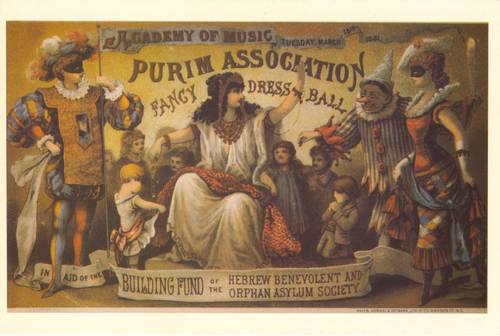
Oy, do we need Purim this year!
Like so many other texts of our tradition, the Purim tale is one of survival and victory over oppression. We have our heros, Mordechai and Esther (and some would argue Vashti), who through creativity and strength manage to save their people and allow them to practice their faith in freedom. In celebration of the day, we retell the story with great joy, cheering our heros and drowning out the name of Haman with noisemakers. We share treats, and give gifts to people in our community, never forgetting to care for those in need. It is a holiday that is not meant to be taken seriously, and as we dress up in our masks and have a few sips of wine, we are given permission to let down our guard and simply enjoy life.
Yet Purim also holds a profoundly powerful message for us, and in the midst of all the joy, masks and treats, it is also a deeply religious day. As is often pointed out, the Purim story is one of the few texts in the Tanach in which the name of God is not mentioned (the only other is Shir HaShirim, the song of Songs). Yet, our tradition tells us that God is part of the story in a very clear and powerful way, that the heroic acts of the people, the strength and compassion of Esther, Mordechai and the Jews are signs of the work of God. This idea of the “hester panim”, the concealed face of God, appears through the actions of all of the people in the Purim story.
Purim reminds us that we are put on this earth to do “Godly” work, and that our story and the story of our people depends on us. The most profound acts of redemption and the events of our day to day life and relationships are dependent on our actions and deeds. We should never give up on our own role in bringing hope to our world.
And there is another important message in the story of Purim. Near the end of the book of Esther, as we celebrate our victory, we are told: And the Jews experienced light and happiness, joy and honor” (Esther 8:16). We can and should look towards a redeemed world, where compassion, love and healing rule over evil and hatred. Yet, as the Book of Esther reminds us, in the midst of our hard work, we must also make time for joy and celebration. This is the joy that will guide us through the tough times once the light of Purim has faded away.
These powerful words which we read at the end of the Book of Esther are also repeated every week during the Havdalah ceremony that marks the end of Shabbat, the ritual of separation. As the Day of Rest, Shabbat is seen as a taste of the world to come– a messianic future, of peace, of compassion and of joy that will fill our world. As it we leave Shabbat, we rededicate ourselves to the task of not only fixing the brokenness in the world, but also creating more joy. After these words from the Book of Esther are said in Havdalah, we say ken tihiyeh lanu, “may it be so”, expressing our personal and communal hope that we will make it to this place of joy and love–each and every week.
So as we celebrate Purim this year, let us grab hold of the sense of joy and celebration and take it with us the rest of the year. Like the sweet spices of Havdalah, this joy is will help guide us through life and inspire us to enjoy even more the beautiful world in which we live. This is how we move down the path of redemption and this is how we can start to build a more compassionate and more joy-filled world. Hag Purim Sameach, a happy Purim, and may it be filled with enough happiness to carry us through another year!